Microsatellite instability in pediatric and adult high-grade gliomas
- PMID: 17388945
- PMCID: PMC8095570
- DOI: 10.1111/j.1750-3639.2007.00049.x
Microsatellite instability in pediatric and adult high-grade gliomas
Abstract
About 15% of sporadic gastrointestinal and endometrial tumors show the microsatellite instability (MSI) phenotype because of loss of DNA mismatch repair (MMR) function. The incidence of MSI in tumors of the central nervous system still remains controversial. Previous studies reported a particular high frequency of MSI (approximately 25%) in young patients suffering from high-grade gliomas. Based on these data and the fact that in different tumor entities MMR deficiency defines a subgroup of tumors with distinct pathogenesis and particular clinicopathological features that may have impact on prognosis and therapy, we screened 624 gliomas from 71 young and 553 adult patients for MMR deficiency by MSI analysis using three highly sensitive diagnostic markers. Alterations of MMR protein expression was examined by immunohistochemistry. A malignant glioma from an adult patient displayed MSI and concomitant loss of nuclear MSH2 and MSH6 protein expression (0.16%; 1/619). No evidence for MSI or loss of MMR protein expression was observed in 71 gliomas from young patients (0%; 0/71) including 41 high-grade astrocytic tumors. Overall, we observed a much lower incidence of MSI among high-grade pediatric gliomas than initially reported and suggest that MMR deficiency does not play a major role in the pathogenesis of glial neoplasms.
Figures

References
-
- Aaltonen LA, Peltomaki P, Leach FS, Sistonen P, Pylkkanen L, Mecklin JP, Jarvinen H, Powell SM, Jen J, Hamilton SR, Petersen GM, Kinzler KW, Vogelstein B, De La Chapelle A (1993) Clues to the pathogenesis of familial colorectal cancer. Science 260:812–816. - PubMed
-
- Alazzouzi H, Davalos V, Kokko A, Domingo E, Woerner SM, Wilson AJ, Konrad L, Laiho P, Espin E, Armengol M, Imai K, Yamamoto H, Mariadason JM, Gebert JF, Aaltonen LA, Schwartz S Jr, Arango D (2005) Mechanisms of inactivation of the receptor tyrosine kinase EPHB2 in colorectal tumors. Cancer Res 65:10170–10173. - PubMed
-
- Alonso M, Hamelin R, Kim M, Porwancher K, Sung T, Parhar P, Miller DC, Newcomb EW (2001) Microsatellite instability occurs in distinct subtypes of pediatric but not adult central nervous system tumors. Cancer Res 61:2124–2128. - PubMed
-
- Boland CR, Thibodeau SN, Hamilton SR, Sidransky D, Eshleman JR, Burt RW, Meltzer SJ, Rodriguez‐Bigas MA, Fodde R, Ranzani GN, Srivastava S (1998) A National Cancer Institute Workshop on Microsatellite Instability for cancer detection and familial predisposition: development of international criteria for the determination of microsatellite instability in colorectal cancer. Cancer Res 58:5248–5257. - PubMed
Publication types
MeSH terms
Substances
LinkOut - more resources
Full Text Sources
Other Literature Sources
Medical
Miscellaneous

